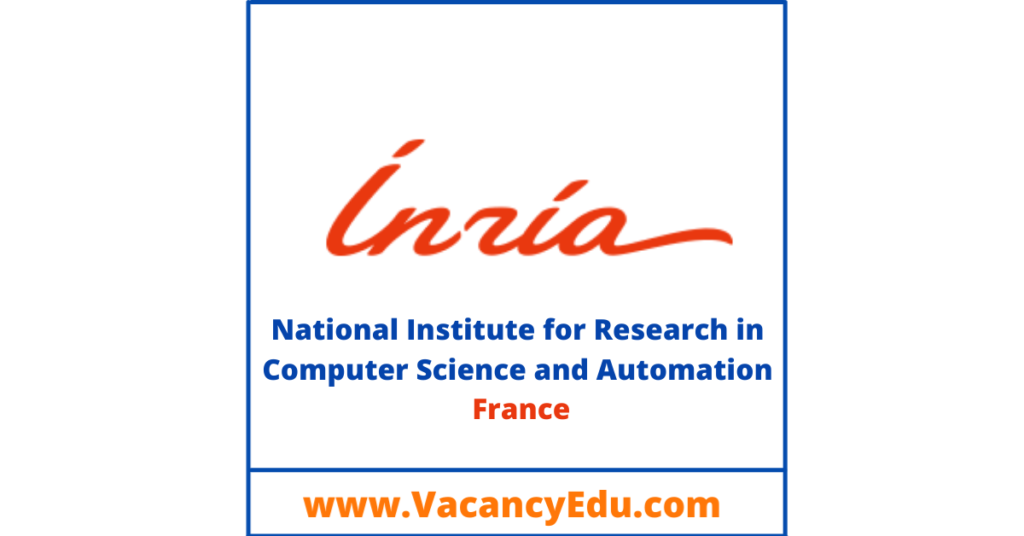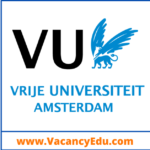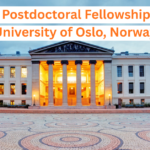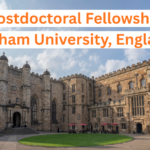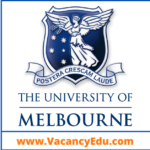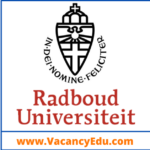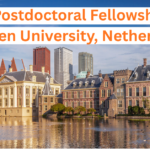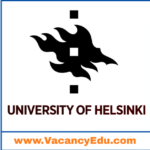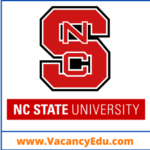Inria, France invites online Application for various Postdoctoral Fellowship in their different Departments. We are providing a list of Postdoc Fellowship positions available at Inria, France.
Eligible candidate may Apply as soon as possible.
(01) Postdoctoral Fellowship Position
Postdoc Fellowship Position summary/title: Post-Doctoral Research Visit F/M Computational design of next-generation optical metasurfaces
Dealing with the above physical contexts regarding dynamicity / tunability and nonlinearity, well require investigating advanced material models and adapt numerical methods currently implemented in teh DIOGENeS software suite.
The second important objective of this postodoctoral project will be to setup inverse design workflows based on the EGO optimization algorithm for unveiling novel metasurface designs with ultimate properties allowing effective operation of active and dynamically tunable metasurfaces on one hand, and nonlinear metasurfaces on the other hand.
The Atlantis team is currently involved in collaborations with several groups of physicisits who are actively working on the fabrication and characterizartion of such metasurfaces. Therefore, the third goal of this project will be to foster these collaborations through experimental demonstrations of the capabilities of the proposed virtual metasurface designs thanks to our adavanced cinoutational modeling, and copublication in high rank journals.
Deadline : 2026-06-30
(02) Postdoctoral Fellowship Position
Postdoc summary/title: Post-Doctoral Research Visit F/M Operator learning for the time-harmonic Maxwell equations
Atlantis is a joint project-team between Inria, CNRS and Université Côte d’Azur, which gathers applied mathematicians and computational scientists who are collaboratively undertaking research activities aiming at the design, analysis, development and application of innovative numerical methods for studying nanoscale light-matter interaction problems. In the recent years, the team has developed the DIOGENeS [https://diogenes.inria.fr/] software suite, which is organized around several numerical tools for the simulation of physical problems related to the fields of nanophotonics and nanoplasmonics. In particular, this software suite implements several high-fidelity fullwave solvers based on high-order Discontinuous Galerkin (DG) methods tailored to the systems of time- and frequency-domain Maxwell equations possibly coupled to differential equations modeling the behavior of propagation media at optical frequencies. Moreover, DIOGENeS also includes algorithms and workflows for the inverse design of nanostructures and nanophotonic devices for harvesting and shaping nanoscale light-matter interactions. The numerical methods currently implemented in DIOGENeS are accurate and flexible but they are also time consuming. For this reason, the team has recently launched a line of research aiming at the design of novel AI-based methods by considering purely data-driven or model-driven modeling approaches.
Deadline : 2026-06-30
Looking for more Postdoctoral Positions Click Here
(03) Postdoctoral Fellowship Position
Postdoc Fellowship Position summary/title: Post-Doctoral Research Visit F/M Distributed Machine Learning at the Network Edge
The position is in the framework of dAIEDGE—A network of excellence for distributed, trustworthy, efficient and scalable AI at the Edge—funded by the European Union.
The vision of the dAIEDGE Network of Excellence is to strengthen and support the development of the dynamic European edge AI ecosystem under the umbrella of the European AI Lighthouse and to sustain the advanced research and innovation of distributed AI at the edge as essential digital, enabling, and emerging technology in an extensive range of industrial sectors.
Deadline : 2026-02-13
(04) Postdoctoral Fellowship Position
Postdoc Fellowship Position summary/title: Post-Doctoral Research Visit F/M privacy preserving federated learning with applications in medical domains
This post-doctoral position will be supported by the HE Trumpet project, the HE Flute project and/or the PEPR IA Redeem project. While this position will be in the MAGNET team in Lille, we will collaborate with the several European project partners.
While AI techniques are becoming ever more powerful, there is a growing concern about potential risks and abuses. As a result, there has been an increasing interest in research directions such as privacy-preserving machine learning, explainable machine learning, fairness and data protection legislation.
Privacy-preserving machine learning aims at learning (and publishing or applying) a model from data while the data is not revealed. Notions such as (local) differential privacy and its generalizations allow to bound the amount of information revealed.
The MAGNET team is involved inthe related TRUMPET, FLUTE and REDEEM projects, and is looking for team members who can in close collaboration with other team members and national & international partners contribute to one or more of these projects. All of these projects aim at researching and prototyping algoirhtms for secure, privacy-preserving federated learning in settings with potentially malicious participants. The TRUMPET and FLUTE projects focus on applications in the field of oncology, while the REDEEM project has no a priori fixed application domain.
The start and end date of the offered post-doctoral positions can be negotiated, subject to the administrative constraints that they start at the earliest on 1/5/2024 and end before or around 30/04/2026 and that individual contracts last no longer than 2 years.
Deadline : 2025-12-31
(05) Postdoctoral Fellowship Position
Postdoc Fellowship Position summary/title: Post-Doctoral Research Visit F/M Postdoctoral position in Quantum Information Theory
The research project will explore quantum protocols based on the concept of quantum nonlocality and quantum networks (see arXiv:2104.10700). A non-exhaustive list of potential projects is:
- Methods for characterizing quantum correlations beyond the Bell scenario:
- mathematical foundation of these methods (C* algebras, noncommutative polynomial optimization): see e.g. arXiv:2210.09065, arXiv:2212.11299, arXiv:2301.12513
- improve/find new algorithms for characterizing these correlations
- numerical developpement of these algorithms, see e.g. arXiv:2211.04483
- Understanding the foundational implications of quantum correlations in networks, see e.g. arXiv:2101.10873 and arXiv:2105.09381
- Develop the applications of network nonlocality to certification protocols, such as
- randomness generation: arXiv:2209.09921
- self testing of measurements and states: arXiv:1807.04956, arXiv:2201.05032
- Adapt existing protocols for their experimental implementation
- Develop practical benchmarks of the concept of ‘Genuine Multipartite Nonlocality’ introduced in arXiv:2105.09381
- Develop SDP relaxations for condensed matter problems, see e.g. arXiv:2212.03014, arXiv:2310.05844, arXiv:2311.18707, arXiv:2311.18706
- Explore the limits of quantum distributed computing, see e.g. arXiv:1810.10838, arXiv:0903.113
Deadline : 2025-12-31
Click here for “Postdoc Application Cover Letter Template”
Click here to know “How to write a Postdoc Job Application or Email”
(06) Postdoctoral Fellowship Position
Postdoc Fellowship Position summary/title: Post-Doctoral Research Visit F/M Brain-heart modeling and analysis for Athletes’ stress assessment
Athletes face significant physical and mental stress during training and competition, which can hinder performance and threaten long-term health.
Developing reliable, objective tools for stress assessment remains a major challenge, due to the complexity and individual specificity of stress responses.
The ANR project 3CI brings together an interdisciplinary team to develop robust stress indicators by combining multimodal physiological and neural recordings (EEG, fNIRS, ECG, blood pressure, and PPG) with advanced signal processing, mathematical modeling, and artificial intelligence.
This project aims to provide new insights into brain-heart interactions and to enable reliable stress monitoring strategies for athletes.
We invite applications for a two-year postdoctoral position starting in January 2026!
The successful candidate will join the BOOST project team at Inria Paris-Saclay and contribute to two central work packages of the project:
Integrating signal analysis and artificial intelligence for characterizing brain-heart interplay and defining relevant stress indicators.
Developing robust mathematical and computational models of the brain-heart interaction under stress, combining physiological modeling, dynamical systems theory, and data-driven methods.
The postdoc will work in close collaboration with an interdisciplinary group of researchers and students in control theory, signal processing, neuroscience, and sports science.
Deadline : 2025-12-31
(07) Postdoctoral Fellowship Position
Postdoc Fellowship Position summary/title: Post-Doctoral Research Visit F/M Integrating fuNctional MRI and EEG with Carbon-wire Loops : towards the characterization of mUltimoDal functional biomarkErs (INCLUDE).
The human brain is organized as a complex network of billions of neurons, each connected to about 100,000 others through axons forming bundles of white matter fibers. Mapping these neuronal connections is crucial to study the neural foundations of both the healthy and pathological brain. Electroencephalography (EEG) and functional magnetic resonance imaging (fMRI) are the main techniques used to assess brain function. EEG measures scalp-level signals that directly reflect neuronal activity with high temporal precision. fMRI, on the other hand, is sensitive to hemodynamic changes and provides an indirect measure of neuronal activity, but with poor temporal precision.
Deadline : 2025-12-06
(08) Postdoctoral Fellowship Position
Postdoc Fellowship Position summary/title: Post-Doctoral Research Visit F/M Longitudinal atlas and regional growth charts of early brain development
Scientific context. This postdoctoral project is part of the JCJC ANR funded project CoYoKi (PI: F. Dégeilh). CoYoKi addresses the methodological challenges of studying brain development and concussion in early childhood (i.e., uniqueness of young child’s brain, individual variability of brain development and injury). It combines cutting-edge advanced neuroimaging, computational and longitudinal statistical models to propose novel individualised and longitudinal neuroimaging methods. To study deviations in brain development, it is essential to understand typical development and its individual variability, a knowledge still lacking, particularly in early childhood due to the absence (until recently) of sufficiently large datasets. This postdoctoral projet will address this gap of knowledge throughout 2 specific aims : 1) Computing a longitudinal atlas of early brain development. A new algorithm will be developed to compute the first longitudinal brain atlas extending from 0 to 5 years. 2) Modelling regional growth charts of early brain structure development. Computational and longitudinal models will be coupled to model the typical trajectories of early brain structure development and their individual variability at the brain regions level.
Deadline : 2025-11-30
Click here to know “How to Write an Effective Cover Letter”
(09) Postdoctoral Fellowship Position
Postdoc Fellowship Position summary/title: Post-Doctoral Research Visit F/M Senior postdoctoral researcher in bosonic quantum error correction
This position will be funded by the “Bosonic Lattice Codes” (BoLaCo) project, a French-German collaboration funded by the ANR and the DFG, in partnership with Prof. Jens Eisert’s group at Freie Universität Berlin. The project aims to develop new theoretical and practical frameworks for bosonic quantum error correcting codes, especially Gottesman-Kitaev-Preskill (GKP) codes.
Deadline : 2025-11-30
Connect with Us for Latest Job updates
(10) Postdoctoral Fellowship Position
Postdoc Fellowship Position summary/title: Post-Doctoral Research Visit F/M Safe AI Planning and Reinforcement learning using Formal Methods
More precisely, we will develop algorithms for multi-environment MDPs, partially observable MDPs, and their variants and apply these in appropriate applications provided by MERCE.
We will focus on developing practical solutions for these formalisms. Some possibilities are to develop solutions based on dynamic programming over finite horizon, or using mathematical solvers, or adapting reinforcement learning algorithms to the desired context. Furthermore, the candidate can also study theoretical properties of the developed algorithms such as their complexity, optimality, and measures such as the regret.
Deadline : 2025-11-30
(11) Postdoctoral Fellowship Position
Postdoc Fellowship Position summary/title: Post-Doctoral Research Visit F/M Scheduling Data-Intensive Applications in P2P Environments
This postdoc position will be funded by the Cupseli Inria Challenge (Défi Inria). The Cupseli Inria Challenge brings together 11 Inria teams distributed over 6 Inria centers and the Hive startup company based in Cannes. The position will be recruited and hosted at the Inria Center at Rennes University; and the work will be carried out within the MAGELLAN team in collaboration with other partners.
The position is for one year.
About Hive:
Hive intends to play the role of a next generation cloud provider in the context of Web 3.0. Hive aims to exploit the unused capacity of computers to offer the general public a greener and more sovereign alternative to the existing clouds where the true power lies in the hands of the users. It relies both on distributed peer-to-peer networks, on the encryption of end-to-end data and on blockchain technology.
Deadline : 2025-11-26
Polite Follow-Up Email to Professor : When and How You should Write
(12) Postdoctoral Fellowship Position
Postdoc Fellowship Position summary/title: Post-Doctoral Research Visit F/M Computational methods for quantum error correction
Main activities :
- Develop and implement algorithms to find quantum error correcting codes with error correction capabilities adapted to physical noise model
- Develop and implement error correction algorithms for such codes
- Using convex optimization methods determine fundamental limits for the achievable error correction abilities for a given geometry of interactions and noise model
Additional activities depending on progress : Use proof assistants to transform the numerical fundamental limits into formal proofs
Deadline : 2025-11-22
(13) Postdoctoral Fellowship Position
Postdoc Fellowship Position summary/title: Post-Doctoral Research Visit F/M Cybersecurity analysis of heterogeneous data in communication networks
The postdoc will work in the context of the COST Action BEiNG-WISE (Behavioral Next Generation in Wireless Networks for Cyber Security. Its main role will consist in collecting, analysing and store heterogeneous data related with different types of cyber-attacks in communication networks. The postdoc will work with other PhD students on their related projects, on Cybersecurity aspects in Industrial Internet of Things, vulnerabilities of IoT devices for home applications and their profiling in normal and under-attacks conditions. The types of data to be collected are heterogeneous in nature, based on collection and analysis of physical , access and application data. Principles of data minimization and anonymization of data will be analysed and alternative solutions/counteract approaches will be proposed in the case of violation.
Deadline : 2025-11-21
(14) Postdoctoral Fellowship Position
Postdoc Fellowship Position summary/title: Post-Doctoral Research Visit F/M Geometric deep learning models to study intrinsically disordered proteins
This postdoctoral position is part of the IDPFold project (2025-2029) recently funded by the French National Research Agency (ANR). The main goal is to develop geometric deep learning models to study intrinsically disordered proteins (IDP). The postdoctoral researcher will be supervised by Hamed Khakzad (Junior Professor, Inria). Our team consists of two permanent researchers with several PhD and postdoc members, and is expected to grow by hiring new members. Our main goal is to develop deep learning models, to study, and predict protein structure, interactions, function and to further design synthetic molecules. The team has access to computational resources, including efficient GPUs and CPUs, from different cluster centers including Grid5000, Jean Zay, etc.
Deadline : 2025-11-07
(15) Postdoctoral Fellowship Position
Postdoc Fellowship Position summary/title: Post-Doctoral Research Visit F/M Stochastic modelling of dynamical resource allocation, analysis and inference for single-cell data
MICROCOSME is an interdisciplinary team that includes applied mathematicians, engineers, computer scientists, biologists as well as experimentalists from the biology/physics team BIOP of the Université Grenoble-Alpes.
Deadline : 2025-11-05
(16) Postdoctoral Fellowship Position
Postdoc Fellowship Position summary/title: Post-Doctoral Research Visit F/M Inverse problem in elasticity with wave separation
We propose a two-years postdoc opportunity in computational inverse problems in the context of the ERC-StG European project Incorwave which aims to develop advanced numerical and mathematical strategies for passive imaging. This postdoctoral position focuses on developing new inversion techniques for elastic media, where body waves play a critical role, and can be decomposed into Primary (P) waves (compressional) and Secondary (S) waves (shear). Traditional inversion methods treat these waves as coupled (working with the full displacement), but separating them offers significant potential to improve the accuracy of the inversion. The successful candidate will spearhead the development of cutting-edge methods and sophisticated software tools designed to efficiently compute P- and S- wave components. To achieve this, we will rely on Discontinuous Galerkin methods which are capable of handling complex discontinuities in the solutions, ensuring high-fidelity wave separation. Once the waves are decomposed, the successful candidate will lead the inversion process for the separated P- and S-wave components, and develop the appropriate strategy for optimal reconstructions. This will directly contribute to the project’s overarching goal of improving passive seismic imaging. The research aims to provide more detailed and accurate subsurface characterizations, which are crucial for a wide range of applications, from geophysical exploration to monitoring subsurface processes.
Deadline : 2025-11-01
Top 25 Free Statistical Analysis Software 2024
(17) Postdoctoral Fellowship Position
Postdoc Fellowship Position summary/title: Post-Doctoral Research Visit F/M Generative AI for Cross-Field Translation of Brain FLAIR MRI: Enhancing Diagnostic Quality from Standard to Ultra-High Field Strengths
As part of a public collaboration with the Institute of Radiology of the University of São Paulo School of Medicine, the goal is to develop a software based on generative AI to generate 7 Tesla (T) magnetic resonance imaging (MRI) images from corresponding images acquired at standard clinical magnetic field strengths (e.g., 1.5 T or 3 T), to improve spatial resolution of MR images, their quality (contrast and signal-to-noise ratio), and ultimately their diagnostic capability.
Several stays in São Paulo will be planned for this position to collaborate with the partner team (Dr. Fabiola Macruz) at the Radiology Institute from the Clinics Hospital of the University of São Paulo Medical School. Travel expenses will be covered within the applicable scale.
Deadline : 2025-10-31
(18) Postdoctoral Fellowship Position
Postdoc Fellowship Position summary/title: Post-Doctorant F/H Analyse de modèles probabilistes pour les services d’urgence
Le travail sera centré sur la modélisation des services d’urgence, plus particulièrement le cas de l’Hôpital Saint-Antoine (AP-HP), Paris 12ᵉ, en effectuant des visites aux urgences et en utilisant les données disponibles. Elles nous permettront de déterminer les valeurs des paramètres cruciaux (voir [4, Section 6.1]). Il s’agira ensuite d’obtenir les conditions et les limites en temps long dans les différents régimes (par exemple, aucun patient vital n’attend), sur des modèles simplifiés.
Le but est d’évaluer sur nos modèles des indicateurs de performance, comme le débit, le nombre de patients de chaque type traités sans délai, mais aussi de dimensionner les ressources (i.e. les différents personnels, les places en termes de box ou lits) qui sont précieuses, ou de repenser la prise en charge (priorités et parcours). Le but est aussi de comparer des scénarios sur des modèles simplifiés pour aider à des arbitrages pour des organisations réelles.
L’objectif du travail est d’utiliser des techniques probabilistes liées aux grands systèmes. On peut citer le modèle présenté dans [2] pour les centres d’appels d’urgence, mais les outils devront s’adapter à notre modèle. L’étude probabiliste sera faite sous des hypothèses simplifiées de durées de consultation de loi exponentielle, et on étudiera d’abord le cas de saturation des entrées. On décrira la dynamique d’un processus de Markov discret et ses équations d’évolution seront écrites. Ensuite, les résultats de convergence seront énoncés et prouvés au moins partiellement. Des scénarios pourront être proposés et comparés.
Tous ces modèles peuvent être simulés. Les simulations permettent de vérifier les heuristiques, valider les résultats et prendre en compte des paramètres non modélisables simplement, tels que des distributions plus réalistes que les lois exponentielles pour les différentes durées. Un simulateur est développé dans le projet.
Deadline :2025-10-31
(19) Postdoctoral Fellowship Position
Postdoc Fellowship Position summary/title: Post-Doctoral Research Visit F/M Expressive yet Explainable Ontology-Based Data Access
The recruited postdoctoral researcher will contribute to the study of foundational and algorithmic questions related to the extension of OBDA. In particular, such extensions will be motivated by a case study in digital agriculture.
The extension of OBDA towards more expressive queries will consider features among aggregation, navigation, and negation. In this context, a theoretical analysis of semantics, as well as decidability and complexity for query extensions, shall be studied.
The candidate will also contribute to the development of novel frameworks for qualitative and quantitative explanations of query results, with special attention to the interaction between expressivity and explanation, especially when dealing with large sets of explanations to enumerate.
Deadline : 2025-10-31
How to increase Brain Power – Secrets of Brain Unlocked
(20) Postdoctoral Fellowship Position
Postdoc Fellowship Position summary/title: Post-Doctorant F/H Modélisation affinée et réduction de modèle de systèmes quantiques ouverts
Nous cherchons à recruter un chercheur postdoctoral afin de renforcer les capacités de l’équipe sur l’étude mathématique des systèmes quantiques ouverts. La recherche pourra s’effectuer en collaboration avec plusieurs membres permanents de l’équipe. L’équipe QUANTIC est un partenariat théorie-expérience sur la technologie quantique à base de circuits supraconducteurs, fournissant un contexte clair et riche pour ces recherches théoriques. Les résultats pourront ainsi servir à l’amélioration des technologies quantiques de pointe.
Le séjour postdoctoral compotera des participations aux séminaires locaux, nationaux, et conférences internationales. Les frais de déplacements seront pris en charge dans la limite du barème en vigueur.
Deadline : 2025-10-31
(21) Postdoctoral Fellowship Position
Postdoc Fellowship Position summary/title: Post-Doctoral Research Visit F/M Bifurcation and robustness analysis in structured population models: Application to female reproductive cycles
The position is an opportunity to be involved in a strongly interdisciplinary consortium, and to strengthen experience in mathematical and computational biology by working on the analysis of coupled ODE-PDE models.
Deadline : 2025-10-30
(22) Postdoctoral Fellowship Position
Postdoc Fellowship Position summary/title: Post-Doctoral Research Visit F/M Network-based biomarker discovery of neurodegenerative diseases using multimodal connectivity
The neurodegenerative diseases like Alzheimer’s (AD) and Parkinson’s (PD) disease are the consequences of pathological processes that begin decades before the onset of the typical clinical symptoms [1][2]. However, current diagnosis comes quite late in the course of the disease, while evidences underline the multiple benefits that would be associated with earlier diagnosis [3]. An outstanding challenge for clinical neurosciences is therefore to provide reliable, non-invasive, affordable and easy-to-track biomarkers able to improve both the early detection and the monitoring of neurodegenerative diseases, that can be applied at an individual level. It is well acknowledged that AD and PD display a progressive multifactorial disruption of cerebral networks, all along the course of the diseases, which is highly related to the clinical phenotype [4].
In the search for those biomarkers, the introduction of non-invasive imaging techniques, such as functional magnetic resonance imaging (fMRI) and diffusion weighted imaging (DWI), prompted important discoveries to provide a comprehensive map of neural connections, known as the connectome. The field of network science for analyzing the connectome offers new insights into networks disruptions that are characteristic of specific brain disorders [5]. Mathematical modelling using graph theory, which appeared in neuroimaging at the beginning of this century, provides powerful quantitative tools and measures for the analysis of complex cerebral networks [6][7]. Undirected brain connectivity has been classified in two categories: (i) structural connectivity estimated by DWI, where links represent axons or neuronal fiber density or (ii) functional connectivity (measured for instance with fMRI) where links represent statistical dependencies between brain signals from different areas, such as correlations, coherence, or transfer entropy. However, prior studies have largely focused on the comparison between patients suffering from AD or PD versus healthy subjects. As a result, the relevance of the reported alterations in brain network may be limited due to a lack of specificity. Indeed, the extracted features that are sensitive to AD or PD may well reflect common neurodegenerative processes, therefore lacking specificity for the disease-related physiopathology at the individual level. Integrating simultaneously these modalities could yield a powerful tool, to expand the knowledge of our brain and to exhibit robust biomarkers of AD and PD, more sensitive to pathophysiological changes.
Deadline : 2025-10-25
(23) Postdoctoral Fellowship Position
Postdoc Fellowship Position summary/title: Post-Doctorant F/H Intégration de l’IRM fonctionnelle et de l’EEG en utilisant des boucles en fil de carbone (INCLUDE)
Il est de développer une méthode d’estimation du connectome à partir des enregistrements simultanés EEG-fMRI. Des différences dans les matrices de connectivité mesurées par EEG et IRMf sont attendues en raison des différences de résolution spatiale et temporelle mais aussi parce qu’elles capturent différents mécanismes de l’activité cérébrale. Une forte corrélation intermodale a été trouvée dans la bande de fréquence EEG-β.
La personne recrutée devra estimer les informations de connectivité communes et complémentaires et la relation entre l’organisation de la connectivité EEG et IRMf dans différentes bandes de fréquences, en utilisant la connectivité dynamique [5]. Cela sera fait en collaboration avec Jonathan Wirsich, Université de Genève, Genève, qui fournira une expertise dans l’estimation de la connectivité dynamique EEG. Le postdoc devra développer une approche
Exploiter les caractéristiques complémentaires et similaires avec une approche de fusion appropriée est crucial pour améliorer l’estimation du connectome et identifier de nouveaux biomarqueurs des maladies. Dans ce contexte, le postdoctorant devra construire des graphes multicouches contenant des matrices de connectivité IRMf et EEG.
Deadline : 2025-10-25
(24) Postdoctoral Fellowship Position
Postdoc Fellowship Position summary/title: Post-Doctoral Research Visit F/M Postdoctoral position Reinforcement Learning for Collaborative Annotation
Deadline : 2025-10-25
(25) Postdoctoral Fellowship Position
Postdoc Fellowship Position summary/title: Post-Doctoral Research Visit F/M Category theory in type theory and vice versa
Within the framework of the FRESCO ERC project, a package is specifically dedicated to the study of proof transport methodologies and tools in type theory.
The purpose of this project is to investigate how interactive provers based on type theory (Rocq, Agda, Lean, etc.) can be turned into an instrument for producing and checking computer-aided mathematics. The agenda of the present position is to provide a better understanding of how to embody category theory and abstract algebra in type theory, in practice.
Deadline : 2025-10-25
About The National Institute for Research in Computer Science and Automation (Inria), France –Official Website
The National Institute for Research in Computer Science and Automation (Inria) is a French national research institution focusing on computer science and applied mathematics. It was created under the name Institut de recherche en informatique et en automatique (IRIA) in 1967 at Rocquencourt near Paris, part of Plan Calcul. Its first site was the historical premises of SHAPE (central command of NATO military forces), which is still used as Inria’s main headquarters. In 1980, IRIA became INRIA. Since 2011, it has been styled Inria.
Inria is a Public Scientific and Technical Research Establishment (EPST) under the double supervision of the French Ministry of National Education, Advanced Instruction and Research and the Ministry of Economy, Finance and Industry.
Disclaimer: We try to ensure that the information we post on VacancyEdu.com is accurate. However, despite our best efforts, some of the content may contain errors. You can trust us, but please conduct your own checks too.
Related Posts
- Postdoctoral Fellowship (17) at University of Calgary, Canada

- Postdoctoral Fellowship (04) at Vrije University Amsterdam, Netherlands

- Postdoctoral Fellowship (16) at University of Oslo, Norway

- Postdoctoral Fellowship (05) at Durham University, England

- Postdoctoral Fellowship (08) at University of Melbourne, Australia

- Postdoctoral Fellowship (03) at Radboud University, Nijmegen, Netherlands

- Postdoctoral Fellowship (11) at Leiden University, Netherlands

- Postdoctoral Fellowship (12) at University of Helsinki, Finland

- Postdoctoral Fellowship (22) at North Carolina State University, USA


